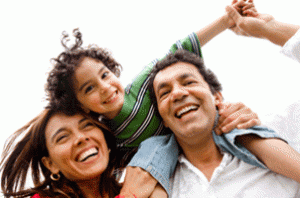Wouldn’t it be great if you could feed off of the weight loss success of your friends and family? Good news – new studies are showing that you really can enjoy the weight loss success of your closer circles. The effort is still on you, but the verdict is if your friends are losing weight, it’s a big motivator for you to jump on the wagon.
Dr. John Morton is director of Bariatric Surgery at Stanford Hospital and Clinics. He had been noticing a pattern amongst the family of gastric bypass surgery patients. Many of his patients’ family members were overweight or obese, most likely heading towards similar procedures such as gastric bypass in the future.
Dr. Morton sees obesity as a family disease. “Just like you impart morals to your son and daughters, you can do the same thing around the dinner table as well and it can be good or bad.”
His study, Halo Effect for Bariatric Surgery: Collateral Weight Loss in Patients’ Family Members, reveals that “60% of adult family members and 73% of children of patients undergoing Roux-en-Y gastric bypass surgery were obese.” He also found in many cases these family members were returning with their loved ones post-op having lost weight even though they hadn’t gone under the knife.
This “halo effect” in which habits are learned from those closest to us, had proved positive when so many times it can be negative. Normally the effect is charged with the spread of alcoholism, promotion of smoking or even triggering weight gain instead of weight loss. Now doctors are finding it can be positive.
To prove his theory, Dr. Morton tracked the weight loss habits of his patients’ families post surgery. He tracked the families of 35 gastric bypass patients over the course of a year. What he found was that these patients’ sons, daughters and spouses were losing anywhere between 8 and 45 pounds. It’s also noted that adult family members were cutting down on uncontrolled or emotional eating and consuming less alcohol than before their loved one’s surgery.
“I think most of the family members who came wanted to help out their spouse, Dad, whoever it might be. They wanted to support them and they supported them by making healthy food choices, by exercising together,” says Dr. Morton.
These findings aren’t limited to families – they’re for friends too. With the success of shows such as Biggest Loser, the social aspect of weight loss has become a hot topic amongst researchers.
Tricia Leahey, a psychiatrist for The Miriam Hospital’s Weight Control and Diabetes Research Center, followed a weight loss competition in Rhode Island in which teams are formed to see who can lose the most weight. The biggest losers were on the same team, where motivation was high to match weight loss leaders. Her study was published in the research journal Obesity.
Even weight loss social networks have been popping up, many of them free for anyone looking for outside motivation to be more active. Weight Loss Wars, one such network which boasts the slogan “Lose together or gain alone,” provides motivation through challenges set up by members. Extrapounds.com provides resources such as exercise logs, weight trackers and food diaries for its members. Traineo, launched in 2006, has similar resources, but awards “Daily Diet Scores” for workout performances and recommends how many calories you should be burning to meet your weight loss goals.
The research and all the tools are out there, so grab your mom, sister, friend or neighbor and get to work!

